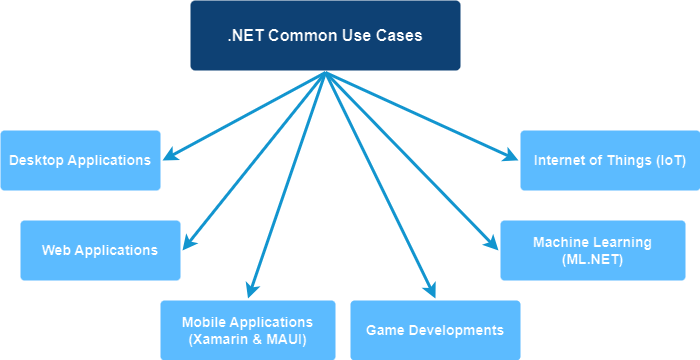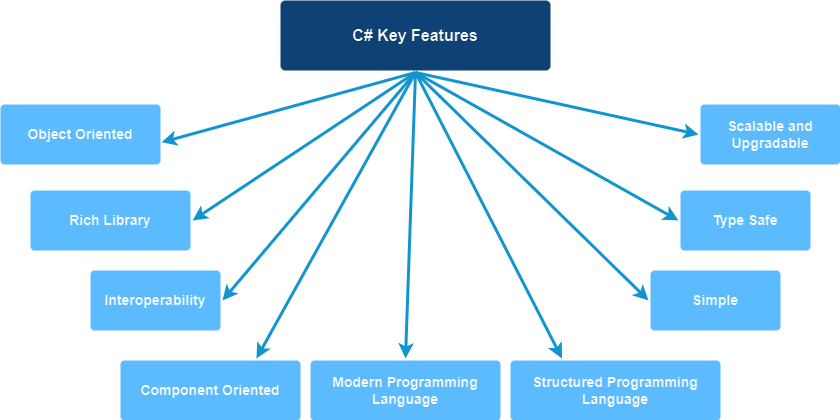When diving into the programming world, distinguishing between .NET and C# can be puzzling. .NET is a framework, that provides a platform for building applications. In contrast, C# is a programming language used within this framework. Despite their close association, it’s crucial to understand that they serve distinct roles in the development process.
In this article let’s make it clear by understanding the fundamentals, key features, common use cases, and differentiable table of C# and .NET.
What Is .NET?
.NET is a popular platform used by millions of software engineers around the world. Made by Microsoft, it gives a place to run applications and a wide range of tools to build them. Its popularity comes from strong support from Microsoft, which keeps it up to date and improves it regularly. Plus, there’s a big community that helps develop it and adds useful features.
It’s free to use and works on multiple platforms like Linux, macOS, and Windows. .NET supports different programming languages such as C#, Visual Basic, and F#. Moreover, it is an open-source platform for building desktop, web, and mobile applications.
Key Features of .NET
.NET allows developers to build cross-platform compatible applications that can run on various operating systems such as Windows, Linux, and macOS. Additionally, it offers programming language independence by supporting multiple programming languages like C#, Visual Basic, and F#. This flexibility allows developers to choose the language that best suits their needs while still being able to use libraries and components written in other languages.
In addition to its robust capabilities, .NET offers a range of key features that empower developers to create cross-platform compatible applications efficiently.
Let’s have a look at some of the core features of .NET:
.NET’s Common Language Runtime (CLR) serves as the execution engine, handling tasks such as thread management, garbage collection, type safety, and exception handling. Furthermore, .NET provides a vast, comprehensive class library that simplifies common programming tasks, including APIs for reading and writing files, graphic rendering, database interaction, and XML document manipulation.
Moreover, Visual Studio is a powerful IDE that enhances productivity with debugging, code suggestions, and other features, making it an indispensable tool for developers. Furthermore, .NET applications are adaptable and simple to maintain due to their modular structure, facilitating ease of development and scalability. Additionally, the large community surrounding .NET and continuous updates from Microsoft ensure comprehensive support and security for any issues.
With each new release, .NET continues to improve its performance, with .NET 8 surpassing previous versions in speed and efficiency. Additionally, .NET applications boast portability and are capable of running on applications on different platforms using the cross-platform .NET Core runtime. Finally, .NET prioritizes security, providing developers with useful classes and services for writing secure code, implementing cryptography, and enforcing role-based security measures.
Common Use Cases of .NET
When using .NET, it can be applied across a wide range of areas.
Let’s explore the diverse applications of .NET across various domains:
In web applications, .NET is widely used for building websites because it provides tools and libraries that simplify the creation of dynamic sites, allowing for less coding. For desktop applications, .NET is ideal for creating Windows desktop apps using Windows Presentation Foundation (WPF) and Windows Forms technologies.
Moreover, in mobile application development, with Xamarin Forms and .NET MAUI, developers can build mobile apps. These apps work on both iOS and Android platforms. In the realm of game development, .NET is used to create 2D and 3D games with frameworks like Unity, offering essential tools for this purpose.
Additionally, .NET excels in the Internet of Things (IoT) and embedded systems. It offers specialized libraries for hardware interaction and facilitates the development of smart devices and systems. Furthermore, with libraries such as ML.NET, .NET seamlessly integrates machine learning models into applications. It is opening up opportunities for leveraging artificial intelligence and enhancing functionalities.
What Is C#?
C# (pronounced “See Sharp”) is a modern, object-oriented, component-oriented, and type-safe programming language developed by Microsoft. It strikes a balance between providing high-level abstraction and allowing low-level control, making it simple and expressive for developers.
C# is the primary language for .NET development. It is known for its versatility and ability to create secure applications on various platforms. Furthermore, Its syntax is similar to C, C++, Java, and JavaScript, making it easily recognizable to developers familiar with these languages.
Let’s write a very simple C# code using .NET 8 in a console app:
using System;
Console.WriteLine("Hello, World!");
The “Hello, World” program starts with a using directive that references the System namespace. Namespaces hierarchically organize the code. Namespaces contain types like System and other namespaces such as System.IO and System.Collections. A using directive that references a given namespace enables unqualified use of the types that are members of that namespace. Because of the using directive, the program can use Console.WriteLine() as shorthand for System.Console.WriteLine().
Key features of C#
C# simplifies programming by offering a structured way to break down problems, a rich library of functions, and various data types. It’s type-safety, ensuring variables have a declared type at compile-time, reducing runtime errors. It restricts memory access to permitted locations, enhancing program security.
Let’s explore some of the key features of C#:
The design of C# considers modern programming trends. This makes it powerful yet simple for creating scalable, interoperable, and robust applications. It focuses on component-oriented programming, making it ideal for building robust and scalable applications. This approach encourages the use of reusable software components, enhancing efficiency and maintainability.
C# stands out as a structured programming language, simplifying programs by dividing them into manageable parts or functions. This feature makes them easy to understand and modify. Furthermore, it comes with numerous built-in functions that speed up the development process. This extensive collection simplifies various programming needs, from basic operations to complex algorithms.
Interoperability enables us to preserve and take advantage of existing investments in unmanaged code. Managed code runs under the control of the Common Language Runtime (CLR), and unmanaged code runs outside the CLR. Finally, C# stands out for its quick compilation and execution, ensuring programs run efficiently and rapidly.
Common Use Cases of C#
C# is a versatile programming language suitable for various applications. This includes mobile apps, desktop apps, cloud-based services, websites, enterprise software, IoT, and games.
Let’s discover its common use cases:
It’s not limited to desktop applications; developers can create cross-platform desktop apps that run seamlessly on Windows, macOS, and Linux. Furthermore, with the help of .NET, developers can develop diverse web applications, including single-page applications facilitated by frameworks like Blazor.
Moreover, for mobile application development, Microsoft provides Xamarin Forms and .NET MAUI, enabling developers to create apps for both Android and iOS. Additionally, C# is highly favored in game development, particularly with the Unity game engine. It boasts over a billion active users worldwide and offers seamless integration with C# for building popular games.
Some notable applications developed with the C# programming language include Microsoft Visual Studio, Paint.NET, JetBrains Rider, and the Microsoft Office Suite.
Furthermore, several companies, such as Microsoft, Stack Overflow, City National Bank, and Delivery Hero, incorporate C# into their development practices, showcasing the wide-ranging adoption in the industry.
Main Differences Between .NET and C#
Let’s take a look at a comparison to understand the key differences and similarities between C# and .NET:
| C# | .NET |
|---|---|
| C# is a programming language that is primarily used for building .NET applications | .NET is a framework for building different kinds of programs using many different languages |
| Open-source | Open-source |
| Since it has similar syntax and concepts with C++, C, Java, and JavaScript, it is easier to learn | It is harder to learn since it has a broad ecosystem with multiple languages (C#, F#, VB.NET), libraries, and tools for various types of development |
| Being Microsoft products, benefit from extensive support from the MSDN community | .NET also has a huge backup and lots of community support. It also benefits from extensive support from the MSDN community |
| Provides the syntax and rules for coding | Provides the environment for executing applications written in C# or other compatible languages |
| Follows a strict syntax with rules governing keywords, semicolon placement, and statement declaration. | It's a framework with an extensive library of pre-existing classes, ready to be utilized right away. |
| Used to develop cross-platform desktop, web and single page applications. | Used to develop Microsoft-based applications. |
| In C#, the Common Language Runtime (CLR) executes intermediate language (IL) code after compilation | .NET's framework includes a runtime environment (CLR) and a class library, where languages like C# compile code into IL. The CLR executes this IL through a combination of compilation and interpretation processes. |
| Supports multi-paradigm programming (OOP & functional), but its usage in the industry leans more towards object-oriented principles | .NET supports a wide range of programming paradigms, especially with languages like F# emphasizing functional programming within its ecosystem |
Here, we highlight the distinct contrasts between C# and .NET. We cover various aspects such as definition, implementation, architecture, working structure, purpose of usage, complexity level, and community support.
Conclusion
In summary, .NET is like a toolbox that helps developers build software, while C# is one of the tools inside that toolbox. .NET is a framework that provides a runtime environment and libraries, while C# is a programming language primarily used for building applications within the .NET framework. They work together to create all sorts of applications, like websites, mobile apps, and desktop programs. Knowing the differences between them is important for developers to use them effectively. Now with a clear understanding .NET and C#, we can make better choices and build great software.







